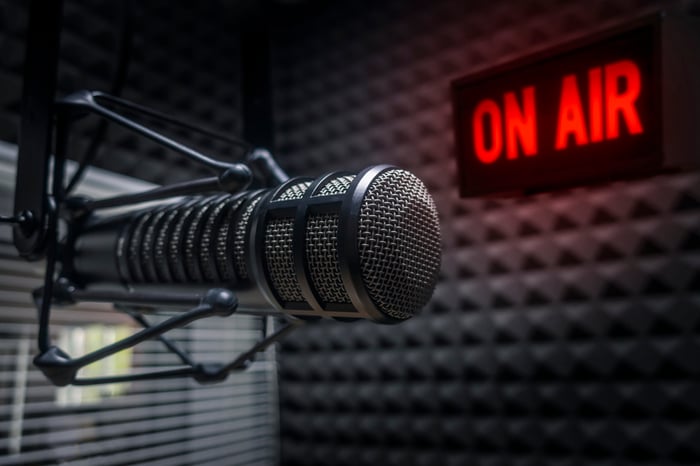Spotify (SPOT 3.41%) is aggressively going after the podcast market, and its early results are showing huge promise.
At the Consumer Electronics Show in Las Vegas last week, Spotify unveiled Spotify Podcast Ads, powered by its new Streaming Ad Insertion (SAI) tool. For the first time, podcast advertisers will have the ability to target ads to Spotify users and evaluate their effectiveness with real-time data. This is a big deal, because podcast advertising has been a relatively primitive advertising method compared to today's advanced methods of online advertising.
If Spotify can achieve its goals, its podcast ads will become better targeted, more relevant to users, more valuable to advertisers, and therefore much more profitable. Investors should be paying much more attention to this.
Why podcast advertising is such an opportunity
Spotify has a huge and growing platform already with 248 million monthly active users (MAUs), 14% of which were podcast listeners as of the third quarter of last year. That's about 35 million podcast MAUs. And podcast listener-hours grew 39% in the quarter. But Spotify is still growing rapidly and could have several hundred million MAUs globally in the future even if it captures a small fraction of its addressable market of 3 billion global smartphones. If Spotify has 600 million MAUs one day, half of whom listen to podcasts, we're talking about potentially 300 million monthly podcast listeners. Spotify could potentially play billions of podcasting ads for its listeners every week. If Spotify can successfully offer targeted and effective ads and real-time feedback on their effectiveness, advertisers will pay much more for podcast ads than they do today. That could be a big win for Spotify.

Image source: Getty Images.
Podcast advertising has been in the wilderness
Today, podcast advertisements are somewhat in the wilderness compared to most forms of digital advertising. Podcast hosts typically read ads in their own voice so as to make them sound more organic and less like a typical ad. That's great, but there are big shortcomings.
-
First, every listener hears the same ad. If you're in your twenties, an ad for adult incontinence undergarments is probably not relevant to you. But you might hear that ad because the only information the advertiser has is that the podcast you're listening to has a significant number of older listeners. Playing that irrelevant ad for you is a missed opportunity.
-
Second, no one knows how many people actually hear these ads or how many times they hear them. More "impressions" are worth more to advertisers, but it's impossible to charge for them without evidence those impressions occurred.
-
Third, podcast ads are not an immediate "call to action" for the consumer. The ads can be influential, but any purchase decision comes later and relies on the listener's remembering the ad.
-
Fourth, it's hard to attribute consumer buying to today's podcast ads.
For all these reasons, today's podcast advertising falls well short of its potential. That minimizes the value of podcast ads -- and, consequently, how much money Spotify can make from them.
Spotify's game-changing solution
Enter Spotify Podcast Ads and SAI. Spotify plans to solve all the shortcomings of podcast advertising by providing advertisers with never-before-seen data on things like how many listeners heard the ad, how many times listeners heard the ad, and certain anonymized information about the audience like age, gender, location, musical tastes and preferences, and the kind of device being used. Ads will be more relevant to the listeners hearing them, more interactive, and more effective. And the bonus is that all this will be transparent and measurable, allowing advertisers to use the data to justify bidding more for podcast ads.
Footwear company Puma was one of the first advertising partners to test SAI, and it said the "results were major." According to Spotify, Puma ran host-read ads on Jemele Hill Is Unbothered, a Spotify original podcast, and the data showed ad recall, a measure of how frequently listeners remembered an ad they heard earlier, improved by 180%.
If Spotify can roll this out with similar results across its own original and exclusive podcasts, eventually all podcasts on Spotify, and potentially third-party podcast platforms as well, this could have a massive impact on Spotify's business. Perhaps that's why Spotify's founder and CEO, Daniel Ek, recently bet 14.6 million euros that Spotify shares would be higher than $210.80 by mid-2022.





